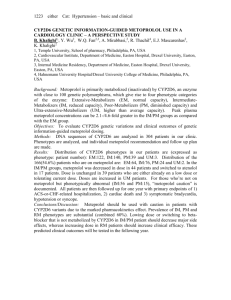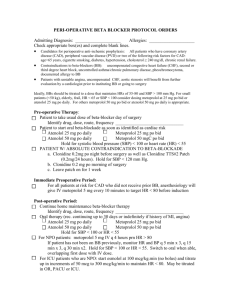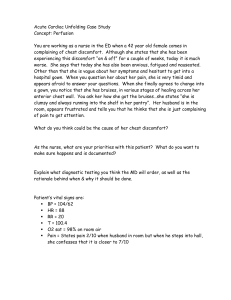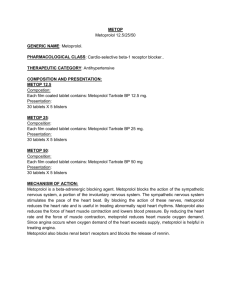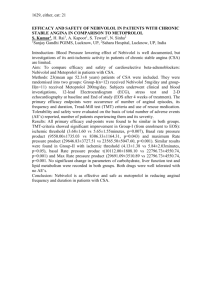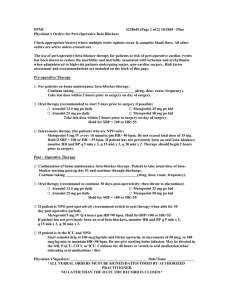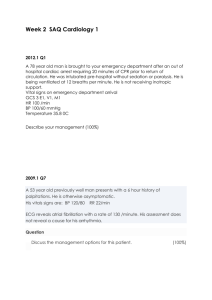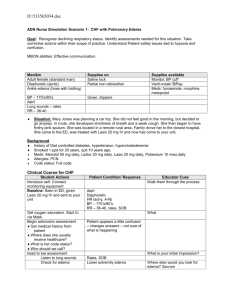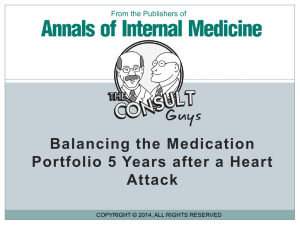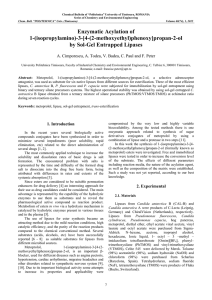How should I take metoprolol?
advertisement
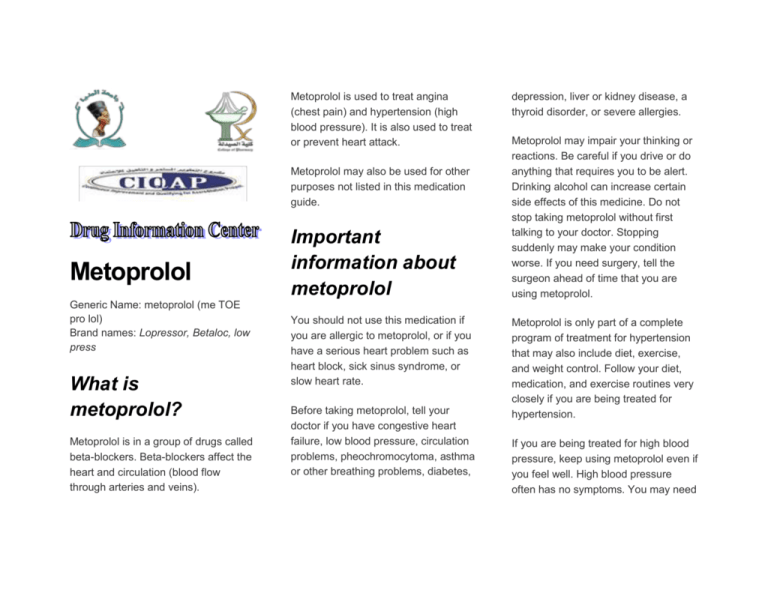
Metoprolol is used to treat angina (chest pain) and hypertension (high blood pressure). It is also used to treat or prevent heart attack. Metoprolol may also be used for other purposes not listed in this medication guide. Metoprolol Generic Name: metoprolol (me TOE pro lol) Brand names: Lopressor, Betaloc, low press What is metoprolol? Metoprolol is in a group of drugs called beta-blockers. Beta-blockers affect the heart and circulation (blood flow through arteries and veins). Important information about metoprolol You should not use this medication if you are allergic to metoprolol, or if you have a serious heart problem such as heart block, sick sinus syndrome, or slow heart rate. Before taking metoprolol, tell your doctor if you have congestive heart failure, low blood pressure, circulation problems, pheochromocytoma, asthma or other breathing problems, diabetes, depression, liver or kidney disease, a thyroid disorder, or severe allergies. Metoprolol may impair your thinking or reactions. Be careful if you drive or do anything that requires you to be alert. Drinking alcohol can increase certain side effects of this medicine. Do not stop taking metoprolol without first talking to your doctor. Stopping suddenly may make your condition worse. If you need surgery, tell the surgeon ahead of time that you are using metoprolol. Metoprolol is only part of a complete program of treatment for hypertension that may also include diet, exercise, and weight control. Follow your diet, medication, and exercise routines very closely if you are being treated for hypertension. If you are being treated for high blood pressure, keep using metoprolol even if you feel well. High blood pressure often has no symptoms. You may need to use blood pressure medication for the rest of your life. Before taking metoprolol You should not use this medication if you are allergic to metoprolol, or if you have a serious heart problem such as heart block, sick sinus syndrome, or slow heart rate. If you have any of these other conditions, you may need a dose adjustment or special tests to safely use metoprolol: congestive heart failure; low blood pressure; pheochromocytoma; problems with circulation (such as Raynaud's syndrome); asthma, bronchitis, emphysema; diabetes; depression; liver or kidney disease; a thyroid disorder; or severe allergies. FDA pregnancy category C. It is not known whether metoprolol will harm an unborn baby. Tell your doctor if you are pregnant or plan to become pregnant while using this medication. Metoprolol can pass into breast milk and may harm a nursing baby. Do not use this medicine without telling your doctor if you are breast-feeding a baby. How should I take metoprolol? Take metoprolol exactly as prescribed by your doctor. Do not take in larger or smaller amounts or for longer than recommended. Follow the directions on your prescription label. Take metoprolol at the same time every day. Metoprolol should be taken with food or just after a meal. A Toprol XL tablet can be divided in half if your doctor has told you to do so. The half tablet should be swallowed whole, without chewing or crushing. Chewing or crushing the pill could cause too much of the drug to be released at one time. Do not skip doses or stop taking metoprolol without first talking to your doctor. Stopping suddenly may make your condition worse. Your blood pressure will need to be checked often. Visit your doctor regularly. If you need surgery, tell the surgeon ahead of time that you are using metoprolol. Metoprolol is only part of a complete program of treatment for hypertension that may also include diet, exercise, and weight control. Follow your diet, medication, and exercise routines very closely if you are being treated for hypertension. If you are being treated for high blood pressure, keep using metoprolol even if you feel well. High blood pressure often has no symptoms. You may need to use blood pressure medication for the rest of your life. Store metoprolol at room temperature away from moisture and heat. What happens if I miss a dose? Take the missed dose as soon as you remember. Skip the missed dose if it is almost time for your next scheduled dose. Do not take extra medicine to make up the missed dose. What happens if I overdose? Seek emergency medical attention. Overdose symptoms may include slow or uneven heartbeats, shortness of breath, bluish-colored fingernails, dizziness, weakness, or fainting. What should I avoid while taking metoprolol? Metoprolol may impair your thinking or reactions. Be careful if you drive or do anything that requires you to be alert. Drinking alcohol can increase certain side effects of metoprolol. Metoprolol side effects Get emergency medical help if you have any of these signs of an allergic reaction to metoprolol: hives; difficulty breathing; swelling of your face, lips, tongue, or throat. Call your doctor at once if you have any of these serious side effects: chest pain, pounding heartbeats or fluttering in your chest; feeling light-headed, fainting; feeling short of breath, even with mild exertion; swelling of your hands or feet; nausea, upper stomach pain, itching, loss of appetite, dark urine, clay-colored stools, jaundice (yellowing of the skin or eyes); easy bruising, unusual bleeding (nose, mouth, vagina, or rectum), purple or red pinpoint spots under your skin; wheezing, trouble breathing; depression, confusion, memory problems, hallucinations; or cold feeling in your hands and feet. Less serious metoprolol side effects may include: dry mouth, constipation, heartburn, vomiting, diarrhea; decreased sex drive, impotence, or difficulty having an orgasm; headache, drowsiness, tired feeling; sleep problems (insomnia); or anxiety, nervousness. What other drugs will affect metoprolol? Tell your doctor about all other medicines you use, especially: digoxin (digitalis, Lanoxin); clonidine (Catapres); ritonavir (Norvir); terbinafine (Lamisil); a diuretic (water pill); cold medicines, stimulant medicines, or diet pills; anti-malaria medications such as chloroquine (Aralen) or hydroxychloroquine (Plaquenil, Quineprox); medicine to treat depression or mental illness, such as bupropion (Wellbutrin, Zyban), fluoxetine (Prozac, Sarafem), paroxetine (Paxil), thioridazine (Mellaril), and others; a MAO inhibitor such as furazolidone (Furoxone), isocarboxazid (Marplan), phenelzine (Nardil), rasagiline (Azilect), selegiline (Eldepryl, Emsam, Zelapar), or tranylcypromine (Parnate); a diabetes medication such as insulin, glyburide (Diabeta, Micronase, Glynase), glipizide (Glucotrol), chlorpropamide (Diabinese), or metformin (Glucophage); a heart medication such as nifedipine (Procardia, Adalat), quinidine (Quin-G), propafenone (Rythmol), reserpine (Serpasil), verapamil (Calan, Verelan, Isoptin), diltiazem (Cartia, Cardizem); or medicine for asthma or other breathing disorders, such as albuterol (Ventolin, Proventil), bitolterol (Tornalate), metaproterenol (Alupent), pirbuterol (Maxair), terbutaline (Brethaire, Brethine, Bricanyl), and theophylline (Theo-Dur, Theolair). This list is not complete and other drugs may interact with metoprolol. Tell your doctor about all medications you use. This includes prescription, overthe-counter, vitamin, and herbal products. Do not start a new medication without telling your doctor.
